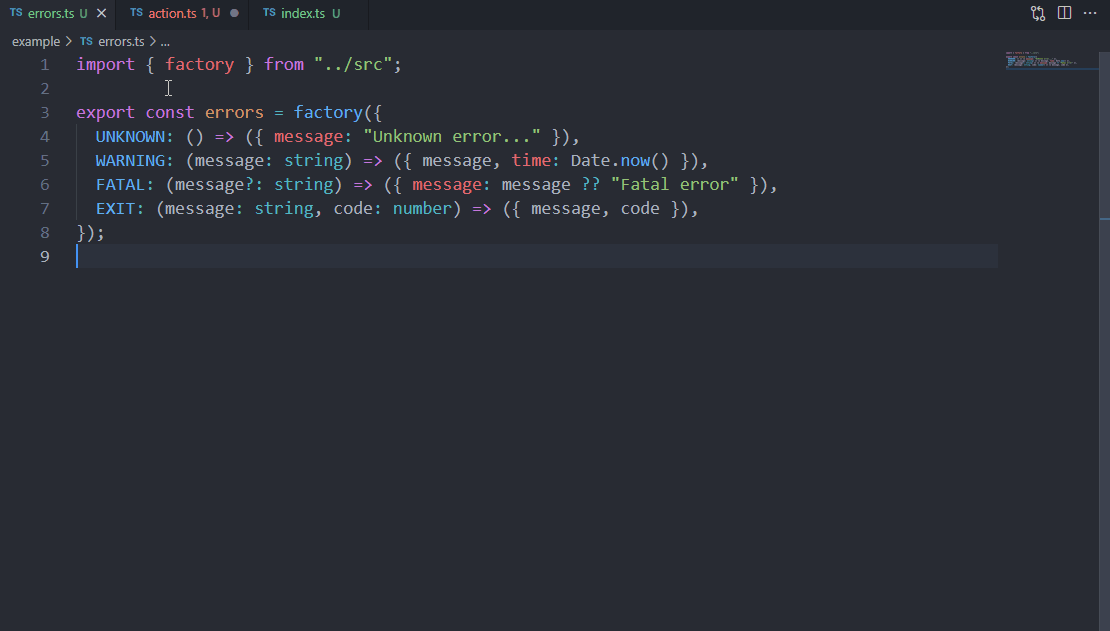🔥 Type safe pojo error will help you to easily create typed and serializable error.
|
|
|

|

|

|

|
Intro
The problem with exceptions is that once caught you don't know what type they are. You can of course create a bunch of custom error classes and use instanceof to overcome this. The advantage of ts-pojo-error is that you have a single error type PojoError which can be easily typed and serialized.
Features
- Type safe & autocompletion
- Serializable output
- Stackable errors
- Node or Browser
- ESM or CJS
- Well tested
Usage
Installation
pnpm add @skarab/ts-pojo-error # yarn and npm also worksDefining an error factory
-
factory( errors:
PojoErrorTypes) :PojoFactory
An error factory is constructed from a Record where the key is the type of the error and the value is a callback that defines the PojoError.
The callback parameters define the parameters passed at the creation of the error and the return value defines the data of the error.
// errors.ts
import { factory } from "@skarab/ts-pojo-error";
export const errors = factory({
UNKNOWN: () => ({ message: "Unknown error..." }),
WARNING: (message: string) => ({ message, time: Date.now() }),
FATAL: (message?: string) => ({ message: message ?? "Fatal error" }),
EXIT: (message: string, code: number) => ({ message, code }),
});Instantiating & Throwing errors
-
new( type:
infered, ...args:infered[]) :PojoError -
throw( type:
infered, ...args:infered[]) :never
The first parameter is always the type of error, the following parameters are the ones you set in the factory.
All parameters have support for autocompletion.
// action.ts
import { errors } from "./errors";
export function action() {
// Do your awsome stuff...
// ...something go wrong, throw an typed error
throw errors.new("FATAL");
// or with a custom error message
throw errors.new("FATAL", "Oupsy!");
// or by using the .throw helper
errors.throw("FATAL");
// or by using the fake enum
errors.throw(errors.type.FATAL);
}Catching & Typing errors
-
is( type:
infered, error:unknown) : boolean -
has( error:
unknown) : boolean
This is where it gets really interesting, the problem with exceptions is that once caught you don't know what type they are. You can of course create a bunch of custom error classes and use instanceof to overcome this. The advantage of ts-pojo-error is that you have a single error type PojoError which can be easily typed and serialized.
The is method is a type guard that will narrow the error to the specific type if the original type is compatible.
In the if block all properties are typed and have support for autocompletion.
// index.ts
import { action } from "./action";
import { errors } from "./errors";
try {
action();
} catch (error) {
error; // <- unknown type
if (errors.is("FATAL", error)) {
error; // <- PojoError instance with type "FATAL"
error.message; // "Oupsy!": string
error.type; // "FATAL": "FATAL"
error.args; // ["Oupsy!"] : [message?: string | undefined]
error.data; // { message: "Oupsy!" }: { message: string }
error.cause; // Error | undefined (see "Stacking of errors" below)
error.toObject(); // { type, args, data, stack?: string | undefined }
error.toJSON(); // string
}
if (errors.has(error)) {
error.type; // "UNKNOWN" | "WARNING" | "FATAL" | ...
}
if (error instanceof PojoError) {
error.type; // any (Bad!)
}
}Stacking of errors
-
newFrom( cause: Error, type:
infered, ...args:infered[]) :PojoError -
throwFrom( cause: Error, type:
infered, ...args:infered[]) :never
Basically it adds a .cause property with the parent error to the newly created PojoError, see Error Cause tc39 proposal for further information.
try {
throw myErrors.new("UNKNOWN");
} catch (error) {
throw myErrors.newFrom(error, "FATAL");
}You can stack any type of error.
try {
throw new Error("Unknown error");
} catch (error) {
myErrors.throwFrom(error, "FATAL");
}Usage with voxpelli/pony-cause
This library coded by @voxpelli includes a couple of helpers inspired by VError, supporting both standard causes and VError causes.
import { stackWithCauses } from "pony-cause";
const error1 = myErrors.new("UNKNOWN");
const erorr2 = myErrors.newFrom(error1, "FATAL");
const error4 = myErrors.newFrom(error3, "WARNING", "Attention to danger !!!");
const error3 = myErrors.newFrom(
erorr2,
"PAGE_NOT_FOUND",
"http://www.prout.com",
);
console.log("We had a mishap:", stackWithCauses(error4));To make the example more readable I have replaced the full stack with ... but the actual output contains it.
We had a mishap: PojoError: Page Not Found: http://www.prout.com
at index.ts:191:31
at ...
caused by: PojoError: Attention to danger !!!
at index.ts:190:31
at ...
caused by: PojoError: Fatal error
at index.ts:189:31
at ...
caused by: PojoError: Unknown error...
at index.ts:188:34
at ...
Contributing 💜
See CONTRIBUTING.md

